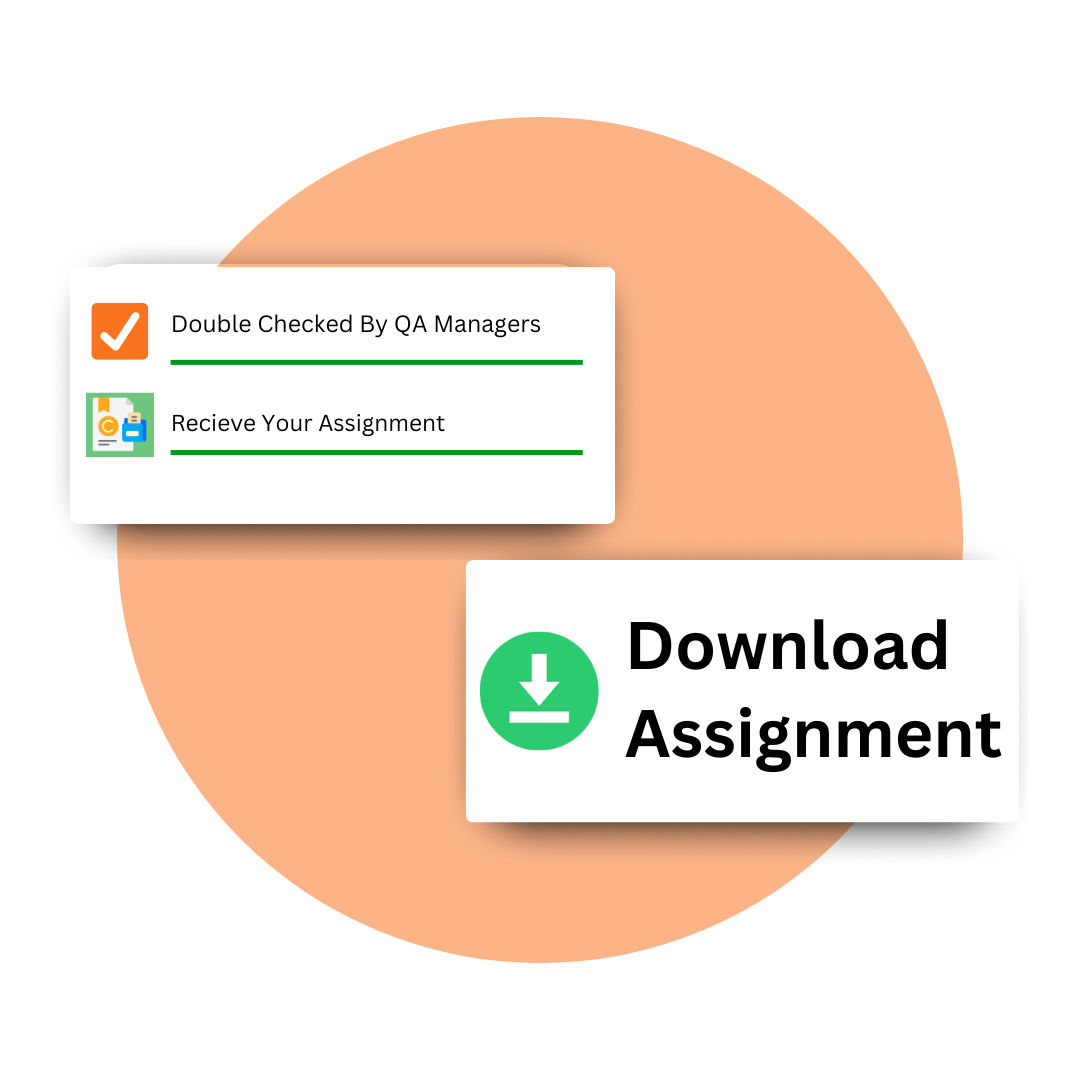Order with ease with our simple and easy assignment ordering process.

Give us your 8600-313 assignment details by providing us with the topic, deadline, number of pages or word count, and any specific instructions that need to go with your assignment.

Once we receive your order, we will assign a writer based on your subject topic, and he will then go through your requirements and provide you with a quote. Accept the quote and pay through our secured payment gateway.

After confirmation of the payment, our writers will start working on your assignment and notify you when it is ready. You can download it through your email or the student portal on our website..
Our team is dedicated to providing you with assignments done completely by our human writers, who are experts in the ILM field of study. So you don't have to worry about your scores after submissions.
We make sure that you get the right help for your assignments at any time of the day. Our dedicated team will be ready to assist you with your query, making your experience hassle-free from start to end.
We provide you with competitive rates at no compromise on quality and no extra hidden fees. Our services are designed to be accessible to students, providing you with value for money.
A team of professional British writers who are proficient in designing quality-based work on every ILM topic following UK universities' guidelines. We have written detailed reports and research papers that we can confidently customise for you as well on a mere hint of an idea.
If you are facing problems with time management or proper skills for structuring your assignments or don’t have enough knowledge on this topic, then hire us. At ilmassignmenthelp.co.uk, your assignments will be done by our ILM-certified British writers, giving you the advantage of expert knowledge and high-quality assignments that will be customised as per your needs, following the rules and guidelines of UK universities.
Our assignments are always AI-free and plagiarism-free, so our customers shall not face any problems after submission. Contact us today and get your ILM Level 3 8600-313 assignment done before the deadline.
Sources of organisational stress:
Impact of Stress on the Organisation:
Signs of Personal Stress:
Other people’s stress symptoms:
Practical Stress Management Technique: Mindfulness Meditation
Mindfulness Meditation is a technique that helps a person overcome stress, as it encourages the individual to pay attention to the moment one is in. It involves paying attention to any sensations, feelings, and thoughts without judgment. It has been proven to do the following:
You may use this skill in the workplace by coaching your workers to take a brief mindfulness break, for example, to focus on breathing in the workplace for a few minutes during the workday.
Responsibilities of Management to Stress
Creating the Supporting Workplace: The management must establish an open, non-discriminatory workplace so that the individuals may feel safe and free and can communicate their stress or problems.
Workload Management: It is management’s responsibility to ensure that the workloads given to employees are reasonable and doable. Management may actually minimise stress levels by delegating equally and offering assistance.
Clear Communication: The expectations, deadlines, and changes at work should be properly conveyed by the management to avoid miscommunication that may easily be a huge stressor.
Providing Resources: Managers ensure that employees have resources to minimise stress, whether it be counselling services or stress management courses.
Encouraging Breaks and Time Off: Encourage the staff to take regular break periods as well as yearly leave, which gives them time to replenish and revitalise.
Actions to Help Manage Stress:
Regular Check-Ins: Meet with individual workers on a regular basis to review their workload, concerns, and feedback. This will allow for early diagnosis of stress.
Providing Training: Employees would be trained in stress management in order to provide them with the tools they need to cope with work-related stress.
Promote work-life balance: Encourage workers to work hard and balance their professional responsibilities with personal leisure and family time, which can help reduce burnout.
When to Give Advice, Counselling, or Mentoring:
Signs of Overworking: If an employee misses deadlines frequently, looks burnt out, or publicly states he feels overwhelmed by his workload, it is time to interfere with assistance.
Behavioural Change: Withdrawal from coworkers or mood swings may be dealt with through therapy or help. Additionally, stress-related health issues can be handled through counselling or help.
Prevention of Escalation: Proactive coaching and advice can be given when an employee is starting to show early stages of stress, thus avoiding further worsening and a more serious result.
How to counsel, advise, or mentor
Active listening: While counselling, an employee is doubtless not to judge him/her out and with sympathy and understanding.
Providing pragmatic answers: Managers or mentors could be more pragmatic in providing practical answers, including supporting the workers with effective time management tactics, stress-relief practices, or even modifications in workload to reduce the tension.
Referral to Professional Counselling: If stress is something that surpasses the employee’s coping capacity or becomes so overpowering that it impacts the employee’s health or job performance, the management should refer the employee to a professional counsellor or EAP.
Our students have received the best-quality assignment answers more than they expected every time.
A
Alex Turner

ILM Assignment Helper played a key role in my success with ILM Level 3 assignments. Their team offered exceptional insights, guidance, and support. They ensured I understood the core concepts and applied them in my coursework, resulting in fantastic grades and a more solid grasp of leadership principles.
M
Michael Thompson

ILM Assignment Helper delivered high-quality work for my ILM Level 7 assignments. Their expert writers incorporated advanced research and real-world examples that directly aligned with my academic needs. With their support, I achieved excellent grades and was able to apply the knowledge practically in my career.
E
Emma Green

I couldn’t have asked for better help with my ILM Level 3 assignments. ILM Assignment Helper’s team provided clear, concise, and well-researched content that directly addressed the challenges in my coursework. With their help, I improved my grades significantly and gained a clearer understanding of leadership principles.
D
Daniel Hughes

I was having difficulty understanding some of the more complex management theories in my ILM Level 5 course. The team at ILM Assignment Helper provided tailored support that helped me break down these concepts into easily digestible pieces. Their research and writing assistance improved my work quality and led to top grades in my assignments.
C
Charlotte Roberts

ILM Assignment Helper was a lifesaver during my ILM Level 7 course. Their expert writers not only provided high-quality, well-researched content but also made sure the assignments aligned perfectly with the requirements of my curriculum. Thanks to their assistance, I passed with distinction and gained insights that will benefit me in my career.
J
James Carter

I was struggling to understand the practical application of leadership theories in my ILM Level 3 assignments, but ILM Assignment Helper made everything clear. The team’s input was invaluable, helping me complete my work with a deep understanding of how these theories apply to real-life situations. I received excellent grades thanks to their support.
Our experts are waiting to deliver high-quality assignments to boost your academic success!
